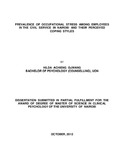| dc.description.abstract | Background: Psychological issues had posed a challenge in human resource management and development and most of the employees were constantly faced with challenges that relate to work and the challenges not only impact negatively on their psychological well being but also on their productivity and overall work performance. This was evident through many cases of indiscipline, chronic absenteeism, negligence, low motivation, alcohol and substance abuse, violence leading to traumatic experiences, HIV and AIDs, Government restructuring and staff rightsizing programmes, social and financial difficulties at the work place. These challenges had both physical and psychological impact on employees' performance necessitating the provision of professional counseling services in the Civil Service by the Government of Kenya which is the employer through the Ministry of State for Public Service.
General Objective: To determine prevalence of occupational stress among employees in the civil service in Nairobi and their perceived coping styles.
Specific Objectives: To compare the prevalence of occupational stress among the junior, middle and senior staff in the civil service; compare the prevalence of occupational stress among gender; find out employees' coping styles; find out awareness of occupational stress among employees at the workplace and find out the effectiveness of counseling services among employees.
Study design: The study design was cross sectional and descriptive.
Study setting: The study was conducted at the headquarters of 14 ministries in Nairobi County. These were ministries of Public Health and Sanitation, Forestry, Fisheries and Wildlife, Housing, Transport, Justice and National Cohesion, Education, Home Affairs, Youth Affairs and Sports, Development of Northern Kenya and other semi arid lands, Regional Development, Nairobi Metropolitan, East African Community and State for Public Service. The total study population was 252 and in each ministry only 18 subjects from job groups A to R were sampled to form part of the study population.
Methodology: Three instruments were used to collect data. Social Demographic Questionnaire (SDQ) and interview schedule were developed by the researcher to collect personal particulars and factors related to work performance. Maslach Burnout Inventory for Human Services and General Survey was used to assess occupational stress among employees. Data was analyzed using a specialized computer package known as Statistical Package for Social Science version utilizing descriptive and inferential statistics. The results were presented in form of tables and narratives.
Result: The study found that employees in the civil service had burnout syndrome; 9.5% and 24.1 % had high and average levels of emotional exhaustion respectively, depersonalization was high at 48.5% and personal accomplishment was low at 93.4%. The precipitating factors included workload (p=O.001); work relationships at the workplace with supervisors and other office workers (p=O.008); role confusion in the organization (p=O.001); changes in the organization (p=O.001) and lack of provision of resources (p=O.009). On comparison of burnout syndrome among the three levels of management, middle managers had high levels of burnout compared to junior and senior managers. Employees identified workplace stressors as too much workload; lack of working tools; poor remuneration and rewards and stress, among others. The employees reported that they had various coping styles they used at the workplace to counter stressful situations. Confiding to a fellow colleague at the workplace by the majority (76.6%) was preferred instead of seeking professional help from a counselor, revealing that there was need to address the stigma associated with counseling. Both the employees and supervisors agreed that the introduction of counseling services in the civil service had reduced some maladaptive behaviour at the work place.
Conclusion: The Maslach Burnout Inventory instrument used to assess prevalence of occupational stress revealed the existence of burnout among employees in the civil service and the contributing job stressors were also identified. Depersonalization was found to be high among employees leading to low personal accomplishment. The employees had developed indifference and cynicism in their work in order to distance themselves from its exhausting demands. The lack of enthusiasm was a direct indicator of exhaustion. This reaction is dysfunctional because cynicism reduces the energy available for performing work and for developing creative solutions to the problems work presents. It also reduces the job's potential for building professional efficacy. Therefore, cynicism positively correlated with exhaustion and negatively correlated with personal accomplishment (Enzmann, Schaufeli and Girault, 1995). The study also established that burnout syndrome had not been known to the study population before and how it was influencing their work output and their personal levels of functioning.
Recommendations: that top management in the civil service should give more financial support to the counseling unit to collaborate with ministries to mount more programmes on sensitization on counseling services to help eradicate stigma about seeking counseling services. They should also demonstrate and encourage awareness, understanding and openness in relation to the issues of stress and mental health in the workplace: | en |

